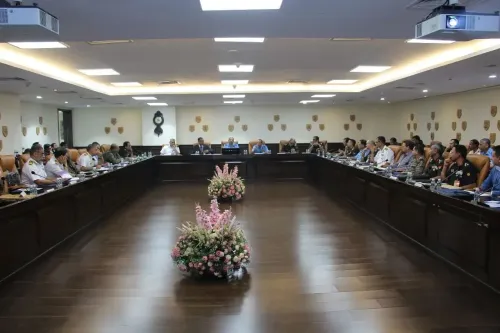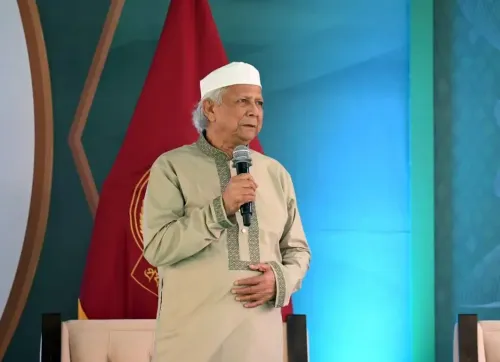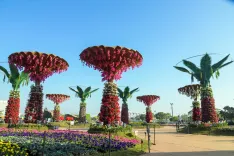Is Pakistan Using Bangladesh as a Base for Anti-India Operations?

Synopsis
Key Takeaways
- Pakistan is allegedly using Bangladesh for anti-India operations.
- Training camps are reportedly established in remote areas.
- Over 125 recruits are undergoing military-style training.
- Connections to D-Company highlight the drug-terror nexus.
- Regional stability is at risk without coordinated efforts.
Dhaka, Nov 21 (NationPress) In addition to its narcotics network, Pakistan is utilizing Bangladesh’s land for direct operations against India. Reports reveal that the Inter-Services Intelligence (ISI), along with former Pakistan Army commandos, is training over 125 recruits—comprising more than 50 Rohingya youths and members of terror groups like Ansarullah Bangla Team and Hizb-ut-Tahrir—at isolated camps located in Bandarban, Brahmanbaria, and Sylhet districts of Bangladesh.
The training includes skills such as improvised explosive device construction, guerrilla tactics, and border infiltration, with camps strategically established near unguarded stretches of India’s northeastern border, preparing recruits for sabotage missions within India.
According to a report from South Asia Press, “Bangladesh is becoming a vital component in Pakistan’s hybrid warfare strategy. The ISI is exploiting connections with notorious underworld figure Dawood Ibrahim’s D-Company to create narcotics trafficking routes and terrorist training sites on Bangladeshi soil. Intelligence assessments suggest that following the political turmoil in Dhaka in 2024, which saw the rise of an interim administration led by Muhammad Yunus, Islamabad has intensified efforts to turn Bangladesh into a base for destabilizing India and financing global jihadist groups.”
The partnership between the ISI and Dawood, established during Pakistan’s 'narco-jihad' phase under General Zia-ul-Haq, has effectively merged drug money with covert operations. Dawood’s Karachi-based syndicate, labeled a terrorist organization by the United States, now funnels Afghan heroin, methamphetamine, and synthetic drugs through Bangladesh’s ports after Indian crackdowns disrupted conventional trafficking routes. A significant seizure in October 2025 at Chittagong Port revealed 25 tons of narcotics-grade poppy seeds hidden within a Pakistani 'bird feed' shipment, showcasing advanced concealment techniques associated with ISI operations.
The report also notes that recent policy changes under Bangladesh’s interim government led by Muhammad Yunus have eased this infiltration, with exemptions from mandatory inspections for Pakistani cargo in September 2024 and relaxed security clearances for Pakistani nationals in December 2024 paving the way for operatives and illicit goods.
As per multiple media reports, the D-Company is establishing logistical hubs in Chattogram and Cox’s Bazar, channeling funds through real estate and hawala networks while forming partnerships with Myanmar-based drug trafficking syndicates.
These actions align with Islamabad’s broader goal of surrounding India through proxy warfare, flooding its northeastern region with narcotics and insurgents, and undermining Bangladesh’s secular framework to impose a more compliant Islamist regime.
“By transferring high-risk drug operations to Bangladesh, Pakistan protects itself from Financial Action Task Force scrutiny while generating billions to support terrorism. Regional security officials warn that, without coordinated countermeasures, Bangladesh risks becoming entrenched as South Asia’s narco-terrorism epicenter, posing direct threats to India’s internal stability and the maritime security of the Bay of Bengal,” the report stated.









